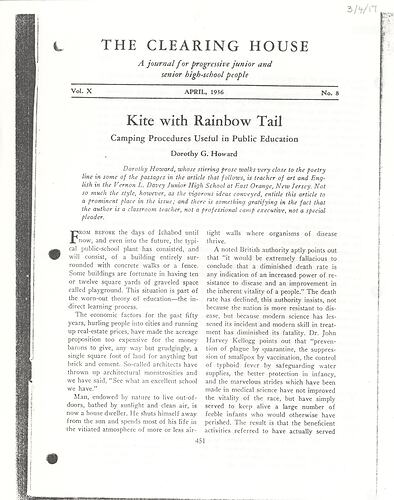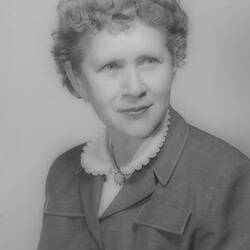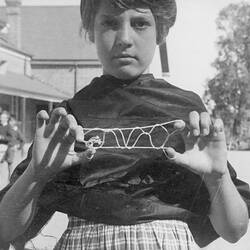Summary
Article titled 'Kite with Rainbow Tail: Camping Procedures Useful in Public Education' written by Dorothy Howard and published in The Clearing House in 1936. Howard seeks to reform the popular perspective of education as the provision of buildings, teachers and book facts, arguing that children need space and freedom to develop their minds. Her focus is the reintroduction of unrestricted, physical activity, preferably in natural environments, in school curricula. She laments the lack of space and money allocated to the building of play grounds in public schools, arguing that the stationary, indoor nature of existing school curricula negatively impact the health of children. She argues that despite the money invested in health and the advancements of modern medicine, the population's overall wellbeing is not improving as the origins of ill health are not being effectively addressed. Using Westchester County Camps at Harmon-on-the-Hudson as an example, Howard suggests that organised camps offer a possible model for meeting the creative, physical and unstructured needs of children in a natural environment. She argues that camps offer an escape from traditions and state-led curricula and focus on the development of morals and good health. She concludes that camp principles reflect a recognition of the value of learning from nature and being outdoors, claiming such environments stimulate imagination and meet the varying needs and interests of children.
One of a collection of publications about children's folklore written by Dr Dorothy Howard. Dr Howard came to Australia in 1954-55 as an American Fulbright scholar to study Australian children's folklore. She travelled across Australia for 10 months collecting children's playground rhymes, games, play artefacts, etc. The original fieldwork she collected during this period is held in the Australian Children's Folklore Collection (ACFC) at Museum Victoria and includes index cards, letters and photographs.
Physical Description
Photocopied article with typed black text on paper. Five, unbound pages printed on one side only.
More Information
-
Collection Names
Australian Children's Folklore Collection, Dorothy Howard Collection
-
Collecting Areas
-
Acquisition Information
Cultural Gifts Donation from Dr June Factor, 18 May 1999
-
Acknowledgement
Donated through the Australian Government's Cultural Gifts Program.
-
Collector
-
Author
-
Publisher
The Clearing House, Washington DC, United States of America, Apr 1936
-
Organisation Named
Vernon L. Davey Junior High School, East Orange, New Jersey, United States of America
Dr. Howard was teaching at Vernon L. Davey Junior High School when she wrote this article. -
Person Named
Dr John H. Kellogg, United States of America, 1936
Dr. Howard cites Dr John Harvey Kellogg's (1852-1943) theory on preventing disease and improving the vitality of the human race. -
Classification
-
Category
-
Discipline
-
Type of item
-
Overall Dimensions
216 mm (Width), 280 mm (Height)
Orientation: portrait
-
Keywords


